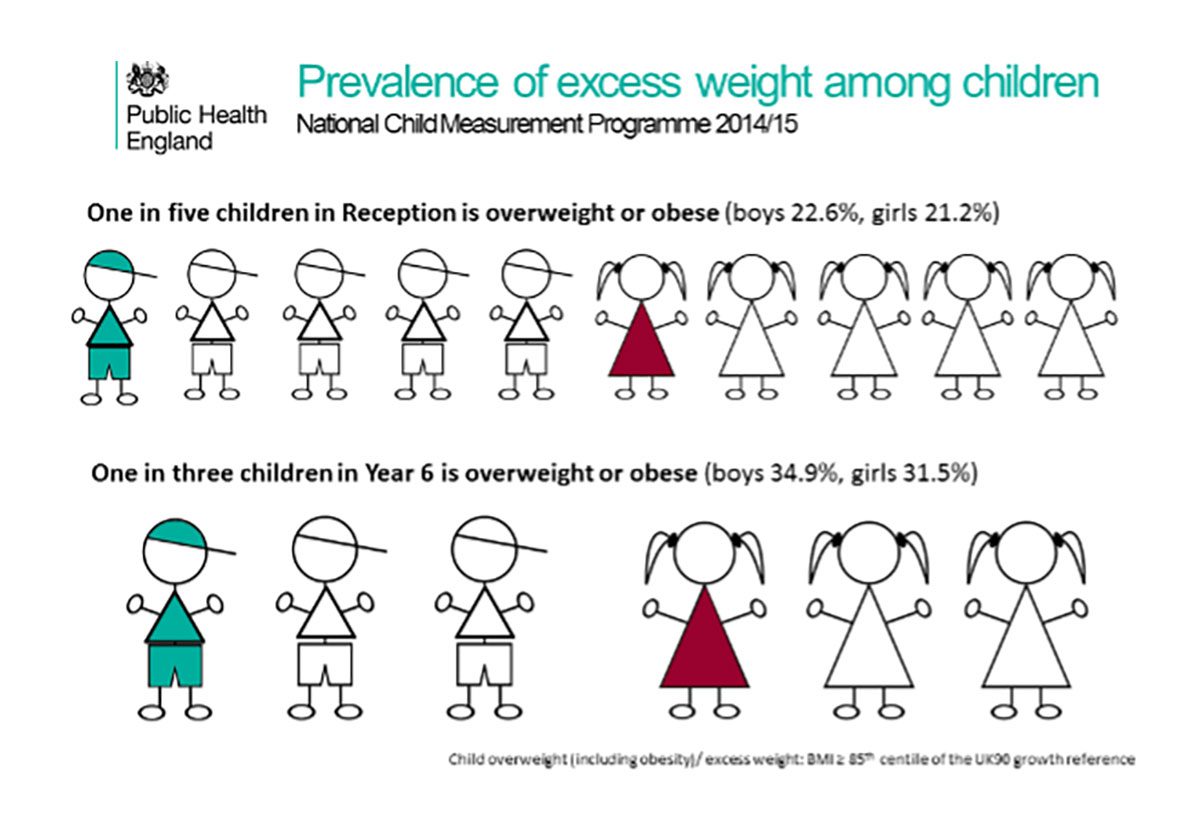The Facts
Childhood obesity is one of the most serious global public health challenges of the 21st Century affecting every country in the world.
In 40 years, the number of school age children and adolescents with obesity has risen more than 10-fold from 11 million to 124 million (2016).
The rise in obesity has a huge economic impact. The UK spends more each year on the treatment of obesity and diabetes than it does on police, fire & the judicial system combined!
Obesity doubles the risk of dying prematurely and is linked to a wide range of diseases including Type 2 diabetes, asthma, hypertension, cancer, heart disease and stroke.
It is estimated that the NHS in England spent £5.1 billion on overweight, and obesity related ill health in 2014/2015 which is set to rise by £10 billion a year by 2050.
Shockingly the Health and Social Care Information Centre states that:
- more than 1 in 5 children are overweight or obese when they begin school
- almost 1 in 3 children are overweight or obese by the time they leave primary school

These childhood obesity figures in England have increased significantly since the pandemic.
Obesity in children has serious implications for their physical and mental health which can follow them into adulthood. An obese child is more than likely going to become an obese adult.
The Cause
The causes of obesity are multifaceted and include behaviour, environment, genetics, and culture.
Obesity prevalence among children living in the most deprived areas is more than double that of those in the least deprived areas.
Black children are more likely to be obese, according to research linking ethnicity and body weight.
Children’s daily sugar consumption from food and beverages is a major contributing factor in their weight gain.
Children are eating larger portions than they require and consuming diets heavy in fat and carbohydrates.
Low levels of activity and sedentary behaviours (watching TV & playing video games) in children and young people exacerbate the problems of poor diet and nutrition.
At its root, obesity is caused by an energy imbalance, taking in more energy through food and drink than is used through activity.
The Solution
Long term sustainable change is only achieved through the active engagement of schools, communities, families, and individuals.
As a nation, we must do more to prevent the promotion of cheap, unhealthy food to children and to reduce its availability.
The whole family should aim to eat a healthy, balanced diet, rich in fruit and vegetables.
Get everyone in the family moving. Children who are physically active from an early age develop lifelong healthy habits.
The UK Chief Medical Officer recommends that all children and young people should engage in vigorous intensity physical activity for at least 60 mins every day.
In England 21% of boys and 16% of girls aged 5-15 years achieve the recommended levels of physical activity and with schools offering, on average, 2 hours of PE per week this is no surprise.
We need to do more to encourage children to be active every day.
Children who engage in physical activity are more likely to have strong muscles and bones, be healthy and fit, sleep well, and maintain a healthy weight.
Xcelerate Gyms is Taking Action
XCELERATE GYMS exclusive X-NATION membership helps to positively develop the mind, body and soul in a fundamental movement and approach to functional fitness for all our members aged 5-15 years.
The aim is to teach key life skills and a love of fitness through both combat sports, martial arts and fun, challenging fitness classes for ages 5-7, 8-10 and 11-15.
THE FOUR FUNDAMENTALS OF THE X-NATION PROGRAMME
- Creating stronger family bonds through family workouts in strength, yoga and fun, functional training classes.
- Teaching children a life skill through martial arts and combat sports classes.
- Developing children’s core motor skills through movement, strength and functional training.
- Providing a focus to work towards and introducing goal setting with our 3 times a year competitions.
SOURCES
Childhood Obesity | World Obesity Federation
Obesity in children | Health Information | Bupa UK
New figures show record increase in childhood obesity since pandemic | Diabetes UK


